Remembrance Day
November 11, 2019Lest we Forget.
As we prepare to acknowledge the end of World War I at ‘the eleventh hour of the eleventh day of the eleventh month’ I would like to share with you a small part of my family’s involvement in this conflict.
 Herbert Clarence Ronan, Service number 265, and Maurice James Ronan, Service Number 421, were my paternal grandmother’s two older brothers. Both were members of the 44th Battalion that was raised in Claremont, Western Australia in February 1916. It was part of the 11th Brigade of the 3rd Australian Division and was known as ‘Old Bill’s Thousand’ after its first commanding Officer, William Mansbridge.
Herbert Clarence Ronan, Service number 265, and Maurice James Ronan, Service Number 421, were my paternal grandmother’s two older brothers. Both were members of the 44th Battalion that was raised in Claremont, Western Australia in February 1916. It was part of the 11th Brigade of the 3rd Australian Division and was known as ‘Old Bill’s Thousand’ after its first commanding Officer, William Mansbridge.
The Ronan brothers left for Britain in June of that same year, headed for Britain and eventually, in March 1917 for the front line in France. History recalls this battle as ‘one ill-fated effort involving almost half the Battalion on 13 March 1917’. Elsewhere it is recorded that by October 1917‘ of the 992 men from the battalion only 158 had emerged unwounded’. By the end of the war only 80 men from the 44th Battalion had survived.
Among the 844 men who did not survive were my Great Uncles ‘Bert and Maurice. Maurice at the age of 20 years passed away on 14 March 1917, one day into battle, and ‘Bert did so on 4 April 1917 in the same battle. My grandmother had lost her two brothers within 21 days!!
While studying in Belgium I was able to visit some of the many Cemeteries where our Australian Soldiers now rest – Ypres and the Menon Gate that has the names of over 15,000 fallen, and Flanders Field. The War Graves in each place were beautifully kept and at the entries to the grave yards there are plans of their layouts and lists of all those buried there.
During term break I made a pilgrimage to France to visit where my Great Uncles had fought and try to find their graves. My first stop was in the small town of Boulogne where I knew Uncle Bert was buried. It was a cold windy autumn day with the streets were ankle deep in autumn colours. Not speaking French was a difficulty but from visiting war graves in Belgium I knew the best thing to do was to find the Information Bureau and show them my Australian Passport and that they would then welcome me and know that I was there to find a loved one. With map in hand (all in French!) I set out on a short winding road to the Boulogne Eastern Cemetery intending to stand at the foot of my Uncle’s grave – the first relative to visit for 83 years.
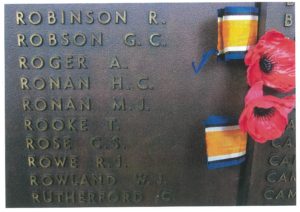 As I stood there, I thought of my great grandparents, my grandmother and her two sisters and younger brother, my father and his brother who never met their uncle and the two generations that have followed them.
As I stood there, I thought of my great grandparents, my grandmother and her two sisters and younger brother, my father and his brother who never met their uncle and the two generations that have followed them.
Leaving Boulogne which is on the coast bordering the English Channel I headed back towards Lille and on to Armentieres, the closest station to the Cite Bonjean mil Cemetery. Repeating the procedure that I had followed in Boulogne I set out map in hand – still all in French – for a small hike to the cemetery and easily located Uncle Maurice’s grave, thanks to the reverence with which the locals care for the fallen. How I wished that my Grandmother was still alive to know that ‘the boys’ had been visited!
Kathleen Hitchcock rsj
History Source: Australian War Memorial
Picture original Linzi Carter. Used with permission.
Year of Indigenous Languages: Chinese and Nepalese
November 8, 2019The United Nations has declared 2019 as the International Year of Indigenous Languages. To celebrate, for each month this year, you’re invited to view greetings for different languages.
For November we feature the languages Chinese and Nepalese:
Chinese
 2015年教宗方济各在关于守护受造界的《愿祢受赞颂》通谕中写道,“文化的消失与动植物物种的消失相比同样严重,甚至于更严重”。“由此看来,必须特别照顾和保护原住民团体及其文化传统”(参阅:145-146节)。
2015年教宗方济各在关于守护受造界的《愿祢受赞颂》通谕中写道,“文化的消失与动植物物种的消失相比同样严重,甚至于更严重”。“由此看来,必须特别照顾和保护原住民团体及其文化传统”(参阅:145-146节)。
土著语言也向人类敞开了一扇神奇的大门,让我们得以一窥祖先在农业、生物、天文、医学和气象学等领域的知识和经验。
祝愿今年土著语言国际年作为一个转折点让我们把本土语言保护传承下去。
Pope Francis addressed in the Encyclical Laudato Si that the disappearance of a culture can be just as serious, or even more serious, than the disappearance of a species of plant or animal. In this sense, it is essential to show special care for indigenous communities and their cultural traditions. (Referring to Chapter 145 and 146)
Indigenous languages specifically are doors to invaluable knowledge and ancestral practices on agriculture, biology, astronomy, medicine, meteorology and much more.
We pray the year of 2019 is a turning point in our collective determination to save indigenous languages.
Nepalese
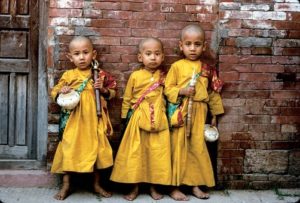 परमेश्वर सृष्टिकर्ता आत्मा, हामीसँग हिंड्नुहोस् र हामीलाई जीवनको लागि खडा रहन शक्ति दिनुहोस्, विनाश र पृथ्वीको लोभको सामना गर्नुपर्दा।
परमेश्वर सृष्टिकर्ता आत्मा, हामीसँग हिंड्नुहोस् र हामीलाई जीवनको लागि खडा रहन शक्ति दिनुहोस्, विनाश र पृथ्वीको लोभको सामना गर्नुपर्दा।
हामीलाई हाम्रो भूमि र पानीले प्रदान गर्ने सबैको लागि आदर र अनुकम्पा हुन सिकाउनुहोस्।
God Creator Spirit, walk with us and give us the strength to stand for life, in the face of destruction and greed of the Earth.
Teach us to be respectful and gracious for all that our land and waters provide.
Three people walking towards red photo by Chastagner Thierry on Unsplash. Nepal Children Boys Begging Native Dress Standing obtained on Max Pixel. Both images used with permission.
A Day in the Life: Josephite Justice Network & Josephite Action Group
No Two Days the Same.
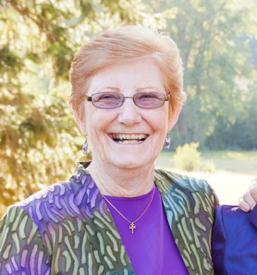
I love being part of the Josephite Justice Network (JJN) and the young Josephite Action Group (JAG). This love was nurtured from childhood. My father particularly embodied for me what it meant to fight for those pushed to the edges. As well, my Josephite education taught me to see needs and do something about them, and my Josephite life has given me opportunities that otherwise I might never have had.
It is a truism to say that no two days are the same in justice work. JJN has been most closely involved in recent months in the climate crisis, the Uluru Statement from the Heart, asylum seekers and refugee issues, affordable housing and the accelerating gap between rich and poor. The great joy of being part of the Network is the fact that all of us have passion for justice across all these areas, but that different members focus on particular issues and call on the rest of us when necessary to join with them on a particular concern.
In our morning prayer today, the psalmist assured us that “the God of truth and justice fills the earth with love”. A great reminder! At our last JJN meeting we shared our belief about the importance both of speaking the truth – in love – and giving hope. It is this that motivates and reassures me as we take action in the many ways, we have done this year.
- Josephites supported the climate strike in correspondence and media statements. Across Australia, New Zealand and Ireland, Josephites participated in the huge rallies that drew such world attention (although they resulted in no action from the Australian Government, despite condemnation from the United Nations and international environmental bodies).
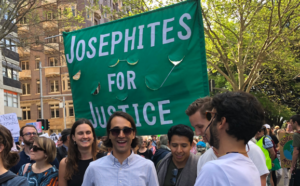 We have worked with refugee families, providing support and welcome (such as picnics and a week-end away), and advocating with them for their rights.
We have worked with refugee families, providing support and welcome (such as picnics and a week-end away), and advocating with them for their rights.- Right around Australia, Josephites have written to their local members and senators to ask why we will not accept New Zealand’s offer to take the refugees from Papua New Zealand and Nauru.
- We are supporting the Uluru statement from the Heart, both on the ground and politically.
- We have been part of the Sydney Alliance advocacy, urging governments to introduce legislation that will provide affordable housing.
- We are actively involved in the Bernard Collaery and ‘Witness K’ case (I’m sure you were in admiration of Susan Connelly’s advocacy on 4 Corners).
- We advocate constantly with Aboriginal custodians and other South Australians for a decision that will refuse to allow a nuclear waste dump in that state.
We struggle as you’d know, realising that in the current political climate, it’s almost impossible to make gains. Meetings, phone calls, letters and visits to politicians, submissions to Government, achieve little more than polite or not so polite rejoinders (mind you, the politician who wrote, ’you stick to your business of saving souls and let us focus on saving the country!” did amaze me).
I was asked last week by one of the young people with whom we work why we persist when so little progress seems to happen.
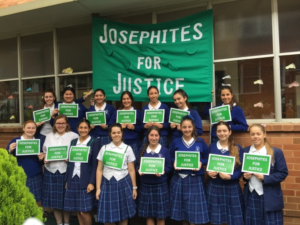 And of course, it’s because I’m continually inspired and challenged by the people with whom I serve each day, including the young woman who asked me this question. It’s also because I can do no other. Belonging the group founded by that woman whose motto was “never see a need …” and continually inspired by those who journey in her footsteps, it’s impossible to do otherwise. Ultimately, I believe strongly in the force for good that the Josephite life can be, and I’ve been enormously blessed in the opportunities I’ve been given to share in it.
And of course, it’s because I’m continually inspired and challenged by the people with whom I serve each day, including the young woman who asked me this question. It’s also because I can do no other. Belonging the group founded by that woman whose motto was “never see a need …” and continually inspired by those who journey in her footsteps, it’s impossible to do otherwise. Ultimately, I believe strongly in the force for good that the Josephite life can be, and I’ve been enormously blessed in the opportunities I’ve been given to share in it.
Jan Barnett rsj
Images provided by Jan Barnett. Used with permission.
Fairtrade Freeze
November 7, 2019Below is an account of an assembly held at one of our Josephite schools – Sacred Heart College, New Town in Tasmania. It was the final initiative of a series of school initiatives to raise awareness around trafficking and fair trade.
During the Secondary Assembly, all active members of the Justice Action Network will receive their badges from staff. As they are applauded and return to their seats, a buzzer will sound, and all the Justice students will freeze where they are.
Hopefully some will be close to their seats, in the aisles, on the stairs and on the stage. This will last for 26 seconds before another buzzer will sound. This buzzer will continue to ring every 26 seconds, until all Justice reps have returned to their seats.
Ella Bulis and Sammi Cacciatori present the Justice Report:
Good morning everyone,
Last term, we had the privilege of hearing about modern day slavery from Fuzz Kito of Stop the Traffik. This term, we celebrated Fairtrade Fortnight by giving away Fairtrade chocolate and hot chocolate. We stood in solidarity with people around Australia and New Zealand watching the documentary about the benefits of Fairtrade in Papua New Guinea. Finally we visited Teros in the city, to discuss the benefits of fair trade and ethical consumerism.
Today we conclude our awareness raising with our report and that action, called the Fairtrade Freeze. You saw our Justice Student Representatives stop for twenty-six seconds as they attempted to be reseated? Did you know that every twenty-six seconds, every time you heard that buzzer, a child is sold into slavery somewhere in the world?
According to current estimates, it is believed one in four victims of modern slavery are children. Despite the fact that many people believe that slavery no longer exists, an estimated five million children are enslaved worldwide.
Child slavery is often confused with child labour, but is much worse. Whilst child labour is harmful for children and hinders their education and development, child slavery occurs when a child’s labour is exploited for someone else’s gain.
You can watch Child Slavery in Ghana by International Justice Mission below:
It’s so important that we all become more aware of the impact our purchases make. Buying Fairtrade is a great way of ensuring that our purchases are making a difference.
You might like to visit the Baptist World Aid website and take a look at their Ethical Fashion Guide to help guide you in your Christmas clothing purchases:
Thumbnail image: Poor Child Labor by billycm obtained from Pixabay. Used with permission.
In the Footsteps of Mary MacKillop Pilgrimage
On Tuesday 22 October, 21 people arrived in Melbourne to participate in the National Pilgrimage – In the Footsteps of Mary MacKillop.
During the time of pilgrimage, pilgrims had the opportunity to hear of the struggles, joys, hopes and dreams of Mary, her family and Father Julian Tenison Woods and the needs of the early white settlers in this country.
While in places of significance in this story, pilgrims were invited to be conscious of the importance of ‘place’ and how this could impact on them if they allowed themselves to be present to it. At these places they took time to pray, in thanksgiving, praise, petition.
One of the significant places we visited was the home of Peter MacKillop’s, Mary’s uncle, at Lara near Geelong in Victoria. Peter owned this place and offered hospitality to Mary’s mother, Flora MacKillop, and Maggie and Peter, Mary’s brother and sister. Here pilgrims were invited to remember the hospitality they have received from others; the hospitality they have offered others and the ways in which they have experienced the incredible hospitality of God.
Pilgrimage calls us to reflect on our own life and the revelation of God within it and the lives of others. Much time was given for pilgrims to intentionally enter into this reflection. As they heard the beginnings of Mary’s story and the influence of her parents in her life, the pilgrims were encouraged to look at their own beginnings and family life and how they have been shaped into the person each is today.
As this pilgrimage within the pilgrimage came to an end, a few pilgrims were invited to share what this experience meant for them:
Through the collection of prayers, reflections and hymns of the past days, I have been provided with the opportunities to reflect on my life and drew on the patience Mary MacKillop that she practised through the trials, tribulations and challenges of her journey.
I pray that I may develop a stillness to become more aware of the love and compassion of Jesus in my daily life.
You might like to follow the pilgrimage in more detail by accessing the Mary MacKillop Place Facebook page below:
Mary MacKillop Place Facebook Page
View some photos from the pilgrimage in the gallery below:
Fr Julian: Man of Words – Letter Ten
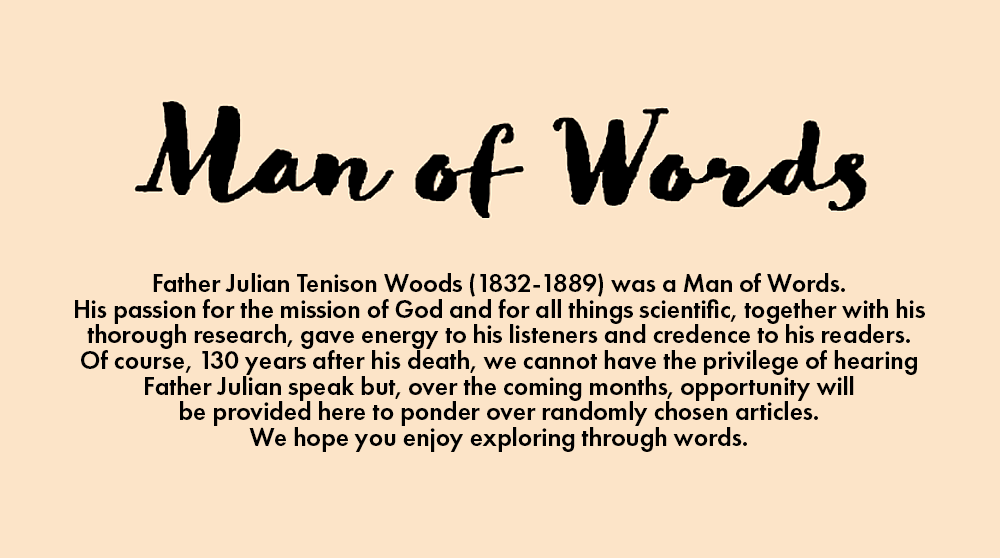
This month we look at the plan for Catholic Education in South Australia that Father Julian Tenison Woods had the task of implementing when he became the first Director General of Catholic Education in Australia.
In 1867 Bishop Laurence Sheil appointed Father Julian Tenison Woods as his Secretary and asked him to leave Penola and move to Adelaide. Once he was there, together, they devised a comprehensive plan for Catholic Education and communicated this at a public meeting held at St Francis Xavier’s Hall on Friday, 26 April 1867. [i]
Are We Advocates for Earth’s Future?
Yes, You Can Buy Ladybugs!
 On Saturday, the 19 October 2019 this response evoked laughter in a Limerick (Ireland) cosmology gathering! Fascinating though Ladybugs or Lady beetles are, why and how would anyone buy or sell them? Perhaps we are not all aware that Ladybugs are the sworn enemy of greenfly and aphids and therefore a valuable asset to even the amateur gardener! And yes, Ladybugs can be bought at some more entrepreneurial and ecologically minded garden Centres!
On Saturday, the 19 October 2019 this response evoked laughter in a Limerick (Ireland) cosmology gathering! Fascinating though Ladybugs or Lady beetles are, why and how would anyone buy or sell them? Perhaps we are not all aware that Ladybugs are the sworn enemy of greenfly and aphids and therefore a valuable asset to even the amateur gardener! And yes, Ladybugs can be bought at some more entrepreneurial and ecologically minded garden Centres!
The hall full of laughing people who had gathered on Saturday morning at Don Bosco Centre, Milford, were more than a little serious about our planet’s future and they were very interested in insects and in promoting biodiversity without the introduction of harmful chemicals. All present at the conference were genuinely concerned about ‘climate change’ and the welfare of our planet. They were gathered to hear what they might do about “a Limerick Response to Climate Change”. Regardless of age or state of health, each person present possessed the capability of contributing to a response to earth’s cry for ‘help!’ Each was ready to embrace the responsibility of responding in some way. Even small changes in our lifestyles can make a difference.
We don’t have to be philosophers or scientists to notice the signs of our times. Our information sources and communication apps bring us an abundance of unwelcome news clips about melting ice-caps, rising sea levels, swamping coastlines, disappearing islands, changing weather conditions and even more local threats to our herds and potato crops. We know we add to that situation through the devastating effects of human activities, e.g., obliteration of rainforest areas, pollution of ocean and water systems, abuse of the land and destruction of natural habitats; and that’s just a few! These behaviours contribute to the loss of biodiversity, diminishment of top-soil and destruction of the very systems: air, sun and water that support our very survival.
The truth is every one of us can make a difference! All is not gloom and doom! In the midst of all the negatives about destructive forces it is encouraging to see some signs of hope. None of us is alone.
Have courage! Developing across the world is a kind of groundswell of people from all walks of life, pointing out the factors that are contributing to the destruction of earth, as well as highlighting ways human beings can respond. Scientists and others are publishing the results of their research. We hear about “Earth Overshoot Day” – marking the date when earth’s population uses more of the planet’s resources than the planet is able to replace. Churches celebrating the “Season of Creation,” (from 1 September to 4 October each year), remind us to respect God’s gift of creation and to care for it. A slogan such as “CUSP” challenges us to “cease using single use plastic”!
Cosmology groups, too, are evolving and becoming more vocal. We can rejoice in the ministry of many Religious Orders who, with a growing number of lay-people, are spending significant energy in developing sensitivity to the environment! Over the last ten years the Salesian Cosmology Group in Limerick has been running conferences to raise people’s consciousness levels about the crisis facing our planet, earth. They have encouraged all who attend to make lifestyle adjustments that are more respectful of earth’s resources and to be mindful that future generations have the right to a healthy planet…
You’re invited to continue reading below:
Continue ‘Are We Advocates for Earth’s Future?’ here (PDF)
Eileen Lanihan rsj
Image: Ladybird on purple flower by Dominque Knobben obtained from Unsplash. Used with permission.
Divine Lover of Life
November 6, 2019Elaine Wainwright suggests that by contemplating creation we will develop love to care for the Earth community.
 This extract from the Book of Wisdom 11:22–12:2, written in the second or first century BCE, belongs to the biblical Wisdom Literature which includes psalms and proverbs, poetry and prose. A key characteristic of the collection, distinguishing it from the more “historical” literature of the Hebrew Bible, is its reflection on life. For the sages responsible for the texts life includes the relationships of the ordinary human community, with the Divine and with the cosmos…
This extract from the Book of Wisdom 11:22–12:2, written in the second or first century BCE, belongs to the biblical Wisdom Literature which includes psalms and proverbs, poetry and prose. A key characteristic of the collection, distinguishing it from the more “historical” literature of the Hebrew Bible, is its reflection on life. For the sages responsible for the texts life includes the relationships of the ordinary human community, with the Divine and with the cosmos…
Continue reading the article below:
Tui Motu Issue 243, November 2019 (PDF)
